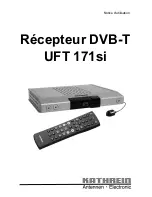
PRODUCT INFORMATION
BULLETIN
105 Bonnie Drive
Butler, PA 16002
724-283-4681
724-283-5939 (fax)
www.bwieagle.com
AIR-EAGLE
®
XLT
900 MHz RF Receiver
MODEL 44UL-2000-DC
DESCRIPTION
The A
IR
-E
AGLE
XLT
is a UL/CSA approved RF system designed for
medium to long range wireless remote control of electrical apparatus in a
variety of industrial applications. Systems can consist of any number of
receivers and handheld or contact input transmitters working together.
This receiver is equipped with 4 independent relays that can switch 5
amps @ 120VAC or 30VDC. The relays are user programmable for
momentary or toggle/latching operation and can be directly interfaced with
the customer's equipment or P.L.C. Seven user selectable frequencies
allow multiple systems to be used in the same area. Capable of receiving
remote signals transmitted from up to 2500 feet away (with the handheld
transmitter) or up to 2 miles away (with the contact input transmitter), the
Air-Eagle XLT utilizes spread-spectrum technology and provides the
utmost security and reliability even in the noisiest RF environments.
Please read through this document in its entirety before proceeding
with installation.
INSTALLATION
DISCONNECT DC Power from all equipment before installation.
1.
Mount the control unit in a suitable location that allows the user to
easily remove the lid of the enclosure for wiring access. When
possible select a location that is not directly beside high energy
transformers or large inductive relay housings. It is recommended to
allow for a minimum of
2.0” clearance on all sides of the unit’s
housing & mounting plate. The power and control wiring exiting thru
the provided cord grips should have ample room to bend without
excessive stress. It is also important that any coax cable connected
to the TNC connector
have room to bend without “kinking”.
2.
Install relay wiring to terminal strip (TER1).
3.
Attach supplied rubber duck antenna to TNC connector on the right
side of the unit.
4.
Connect DC power to the proper terminals in your control circuit.
Note 1: (6) #10 thru holes & (4) 1/4-20 thru holes are provided on the
mounted plate to secure the unit)
Note 2: The recommended power/control wire sizes to the terminal strip
ranges from 24 AWG (0.205mm2) (min) to 18 AWG (0.823mm2) (max).
TERMINAL STRIP WIRING
1
N/O Relay #1
7
N/O Relay #3
13 (-) 10
– 24 VDC
2
C Relay #1
8
C Relay #3
14 (+) 10
– 24 VDC
3
N/C Relay #1
9
N/C Relay #3
4
N/O Relay #2
10 N/O Relay #4
5
C Relay #2
11 C Relay #4
6
N/C Relay #2
12 N/C Relay #4
CONTROLS AND INDICATORS
.
LED1
Illuminated when power is applied to receiver
LED2
Illuminated when relay #1 is energized
LED3
Illuminated when relay #2 is energized
LED4
Illuminated when relay #3 is energized
LED5
Illuminated when relay #4 is energized
RF1
RF module that receives data from the remote
transmitter
REL1 thru REL4
Four SPDT output control relays
SEL1
Seven dip switches for selecting relay options
and operating frequency
Page 1
Summary of Contents for AIR-EAGLE XLT 44UL-2000-DC
Page 4: ......





















